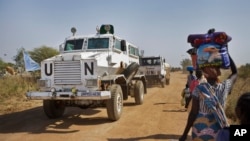South Sudan's government is claiming that the U.N. Security Council mandate to send a new contingent of 4,000 peacekeepers to boost the existing force has expired.
Minister of Information Michael Makuei told the Associated Press that Dec. 15th was the expiration date for the deployment of peacekeepers to bolster the existing 12,000 U.N. troops in South Sudan. He said a new resolution is needed for the additional troops.
The U.N. mission in South Sudan responded in a statement saying that its mandate to increase the protection force had been extended by the Security Council until December 2017.
The U.N. Security Council decided in August to send additional peacekeepers after clashes killed hundreds in South Sudan's capital Juba. South Sudan initially objected to the force and has delayed its deployment.
In October, U.N. peacekeeping chief Herve Ladsous told members of the Security Council behind closed doors that it appeared South Sudan's intent was to "delay the deployment and reduce the political impact of the" regional protection force as much as possible, while stringing along negotiations to "avoid triggering punitive measures," according to a copy of his statement obtained by AP.
South Sudan's civil war began in December 2013 and has killed tens of thousands of people.
Makuei also announced on Sunday that President Salva Kiir created four new states in South Sudan bringing the total number to 32.
"It is the will of the people," Makuei said of the move.
Kiir had already increased South Sudan's states from 10 to 28 in December 2015, a move that was criticized by opposition forces who claimed that the new states were a form of political gerrymandering.
A U.N. panel of experts said in November that the creation of so many new states "has served to heighten ethnic tensions, shift political loyalties and increase competition for power and resources in a deteriorating economy."
The U.N. says South Sudan is experiencing ethnic cleansing and is at risk of genocide.
"The proliferation of states actually increases central power,'' said Alan Boswell, a researcher on South Sudan based in Nairobi. "Kiir can offer new states in complex political negotiations with local communities to lure or divide them."






